by Andrea Scrima (excerpt from a work-in-progress)
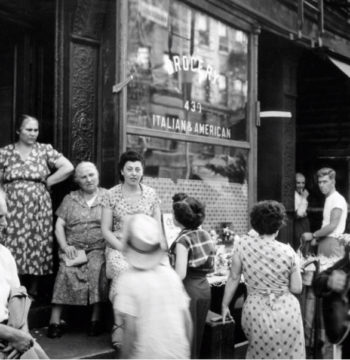 My father, the son of Italian immigrants, was a member of the working class. There were things within reach, and things that were not in reach, and he accepted this. He never pushed his children to broaden their horizons, and would have been satisfied to see them in traditional working-class vocations. When I came home from school eager to show off my grades, he poked fun at me. The prospect of pursuing an intellectual career was alien to him; in his view, taking out student loans to go to college or university was a way for banks to trap the “little guy.” When I presented him with the papers, he refused to sign. There was no discussion. I eventually moved out and managed to get my BFA anyway, and when I wound up as a finalist for a Fulbright, the doctor who performed the general checkup required by the awarding commission—I was still covered by my father’s Blue Cross plan, but only because I was still technically a dependent and it didn’t cost him anything—took him aside and told him that a Fulbright would be “quite a feather in your daughter’s cap.”
My father, the son of Italian immigrants, was a member of the working class. There were things within reach, and things that were not in reach, and he accepted this. He never pushed his children to broaden their horizons, and would have been satisfied to see them in traditional working-class vocations. When I came home from school eager to show off my grades, he poked fun at me. The prospect of pursuing an intellectual career was alien to him; in his view, taking out student loans to go to college or university was a way for banks to trap the “little guy.” When I presented him with the papers, he refused to sign. There was no discussion. I eventually moved out and managed to get my BFA anyway, and when I wound up as a finalist for a Fulbright, the doctor who performed the general checkup required by the awarding commission—I was still covered by my father’s Blue Cross plan, but only because I was still technically a dependent and it didn’t cost him anything—took him aside and told him that a Fulbright would be “quite a feather in your daughter’s cap.”
He must have sensed something. My father mistrusted doctors, all of whom were crooks, and while he relayed the remark to me later, it didn’t seem to have made much of an impression on him. As it turned out, I didn’t receive the Fulbright; a short time later, when I won an equivalent scholarship from a German foundation to attend graduate school in Berlin, he threw me a skeptical look. To his mind, a stipend amounted to charity. It was like getting welfare, and because no self-respecting American would ever stoop so low, I was evidently on the wrong path. He’d already invented a new nickname for me when I moved out: “Wayward,” which neatly captured the moral deviance of a young woman leaving her parents’ home for any reason other than marriage. Yet for all his subtle mockery, I knew that he loved me and that I’d hurt him; now that I’d decided to strike it out on my own in a foreign country, I was leaving behind everything he’d ever known.

In Returning to Reims, philosopher Didier Eribon wrote a sociology of the working class in which he described the mechanisms that prevented French working-class children from rising up out of their parents’ economic misery and advancing to a higher social status. These mechanisms bore a striking similarity to the factors affecting Italian immigrants in American diaspora: while many of the older generation hadn’t made it to university themselves, and were proud to see their offspring get a better education than they’d been able to, more often than not, ethnic identity had the emotional power to trap the children of immigrants and the second-generation working class in a fear of betraying their origins. Instinctively, they understood that attaining to a higher academic or economic status would mean leaving behind everything they’d come from, and it was this fear of losing their identity that held them back.
When Eribon sketched out the political developments in France over the past fifty years, it was to clarify the process by which the traditionally left-wing French working class gradually abandoned the Socialist Party, which had long been ignoring their interests, and embraced the National Front. The rhetoric of the radical right—anti-intellectual, anti-liberal, anti-solidarity, anti-immigration—spoke directly to the disaffected and disenfranchised, who welcomed the chance to recover their pride and didn’t seem to register that the party’s policies essentially exacerbated their economic plight. And in a cruel twist, when their children beat the odds and managed to get an education and make something of themselves, they often accused them of being just like “the people upstairs”—the ones pulling the strings and making the decisions. Not only did their parents show indifference to their achievements; they were quick to remind them not to let it “get to their heads” or to imagine they were anything “better.”
In many Italian immigrant families, the children were often the first to finish high school, and when they brought home university degrees, these became the crown jewels of the clan. In some families, however, education led to tension and posed a threat to parental authority. Traditional attitudes toward religion, family obligations, politics, gender roles, and class consciousness were called into question, effecting a break in the transmission of customs and ideas that had long been taken for granted. And although far greater value was placed on the sons’ education, while paying for a daughter’s college tuition was seen as an unnecessary expense, as she was destined for marriage and childrearing, many young women rejected the traditional role expected of them and essentially defected from a system that was unwilling or unable to accommodate their aspirations.
Over time, these educated children of the working class discovered that the process of self-realization was also a form of erasure; that as they forged a new life for themselves, they were destined to lose a fundamental part of their cultural identity. They no longer belonged to where they came from, no longer even shared a common language. Going home meant either undoing a part of themselves and silently, implicitly agreeing with the views and opinions of their brethren in order to avoid calling undue attention to themselves and offending them, or offering their standpoint and openly questioning views and opinions they opposed, sometimes vehemently.
My father, a lifelong Republican and “Nixon man,” believed in a nobler, better America, and he kept the faith long after evidence of gross misconduct emerged. His sense of personal honor had been founded in a former time, and when he gradually had to concede that the politicians he’d voted for had chiefly distinguished themselves in corruption and hypocrisy, he grew disillusioned and eventually bitter. I wondered what had happened to his spirit of rebellion. He, too, had been young and had undergone a split from his parents’ generation; he was native-born, literate, and fluent in English, and having come of age with the specter of Fascist Italy marring his ethnic identity, he’d decided to become thoroughly, unequivocally American. After the war, still young enough to believe the world’s doors were open to him, he tried to become an artist, but as the son of a fruit vendor, he eventually gave up his dream and resigned himself to blue-collar work to support the family. In all likelihood, it was to protect his children from the disappointment he’d experienced that he wished them more realistic expectations. When I left for Germany and graduate school, I too felt the agonizing pull of home and everything familiar and loved. It wasn’t until much later that I understood that a good part of my leaving was to protect my own spirit of possibility and rebellion, and yet my sympathies—in contrast to Eribon’s, who grew to despise where he’d come from—would forever remain with the working class.
~
In the United States, Italian immigrants were not initially amenable to the labor movement. New arrivals often had no other recourse than to turn to the so-called padroni, compatriot labor brokers who, under the guise of community support, charged them high fees and laid claim to a sizeable percentage of their wages. Immigrants in desperate need of work often took on the worst-paid jobs, labored until terrible conditions, and were denied entry to unions, in large part due to the racist accusations leveled against them. Before long, however, Italians were at the forefront of early twentieth-century labor organization. Many of them had a history of rebellion, and they’d brought this spirit with them when they emigrated; the anarchists, syndicalists, and socialists—the so-called sovversivi or subversives—constituted a movement of Italian American radicalism that brought about a lasting change in labor practices in the country.
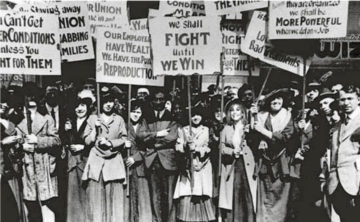
A major turning point came in 1912, when a strike for workers’ rights broke out in Lawrence, Massachusetts that lasted for more than two months. Lawrence was home to several major wool and cotton mills; the machines in what was a largely automated industry ran at a relentlessly rapid pace, and working conditions were dangerous. The majority of the laborers were unskilled immigrant women, half of them between the ages of 14 and 18, although in reality many of the children were younger and working under forged papers. Living conditions were equally appalling: in the families of mill workers, half the children perished before they reached the age of six, while more than a third of the adults fell prey to accidents or succumbed to the excessively damp working conditions in the mills, contracted tuberculosis and pneumonia, and died before the age of 25.
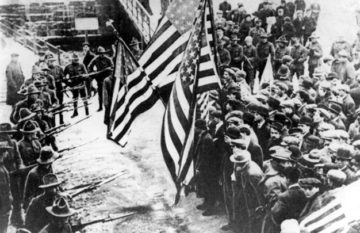
At the beginning of the year, in accordance with a change in federal law, the companies reduced their female and underage employees’ weekly hours from 56 to 54; when the workers realized that the two docked hours would go unpaid, they walked off the job. The city’s response to the strike was to dispatch the local militia; the situation escalated, state police were brought in, and eventually martial law was declared. Italian-born poet Arturo Giovannitti of the Italian Socialist Federation of the Socialist Party of America arrived in Lawrence and addressed the crowds, crying out to them just as they were losing faith: “Ages have come and gone, kingdoms and powers and dynasties have risen and fallen, old glories and ancient wisdoms have been turned into dust [. . .] But ye, Plebs, Populace, People, Rabble, Mob, Proletariat, live and abide forever.” When a striker was killed by a stray bullet, fired in all likelihood by the police, Giovannitti and International Workers of the World organizer Joseph Ettor were arrested and charged with murder.
Contrary to expectations about both immigrants and women, the strikers were well organized, representatives of all ethnic groups were involved in the decision-making, and meetings were translated into 30 languages simultaneously. The IWW sent in representatives who set up nurseries, raised funds, distributed food, and initiated a campaign to send the children of the striking workers to live with strangers in New York City because their parents feared they would no longer be able to feed them. Some of these children weren’t merely the offspring of the workers on strike, but were workers themselves, and losing their wages placed a burden on the families equal to the loss of their parents’ income. As the popularity of the strikers’ cause grew, it unleashed a series of additional strikes throughout the neighboring states that were largely successful. A Congressional committee was set up to investigate the strikers’ claims, and at the hearings, many of the children testified to the conditions they’d been forced to toil under. The moral indignation this caused changed labor practices all throughout New England, a triumph that was temporarily reversed as the nationalist fervor leading up to World War I eclipsed any sense of solidarity with the immigrant “foreigners.”
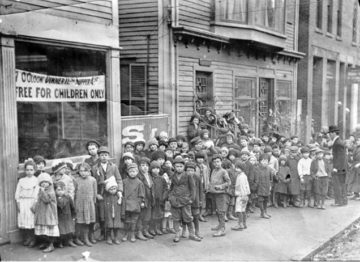
When I think of my grandfather Luigi, who’d emigrated at the turn of the century, I see him wheeling his cart through the streets of the Bronx, engaging in conversation with everyone he came in contact with and discussing the pressing issues of the day. The Italian-language diasporic press reported copiously on the events in Lawrence, and it’s hard to imagine him not catching wind of the news. He can’t have missed the publicity when the Lawrence children, who’d become the face of the workers’ struggle, were paraded down Fifth Avenue and cheered. Here was the immigrant working class, here were people who looked like him, and they were finally fighting back at a system that had been exploiting them for as long as any of them could remember. The Lawrence Textile Strike must have reminded him of the Fasci Siciliani of his youth, loosely organized local “bundles” of peasants, artisans, industrial workers, petty merchants, and sulfur miners who’d banded together in the late nineteenth century to appeal for reform. Although many of the members were forced to flee after the workers’ uprisings were brutally repressed, the contracts they drafted for more equitable working conditions later served as models for the first unions in Italy.
There had been a history of uprisings throughout Sicily and the Italian peninsula; with the fasci, the contadini became the leaders of a larger, more unified movement. Sharecroppers and tenant farmers who had lost access to collective land in the wake of Italian Unification asked for fairer wages, lower rents, and a reduction in tax. When a worldwide depression in agriculture drove down the price of wheat in the 1880s, the situation became dire; a trade war over Sicily’s main exports of fruit, wine, and sulfur induced landowners to pass their losses on to the peasant class. People were so impoverished that many were faced with starvation; the situation escalated to the point of violent insurrection. The peasants, who saw themselves as having been betrayed by Garibaldi, the Italian government, and the Church, all of whom had sided with the feudal aristocracy, felt they had nothing more to lose by occupying land they considered theirs.
Over the last decade of the nineteenth century, the fasci had spread beyond Sicily to form groups in Campania, Calabria, Basilicata, and Apulia. One of the strongest factions, led largely by women, was in Piana degli Albanesi, formerly Piana dei Greci, an Arberësh village in Sicily that became a focal point of the uprisings. The Pianesi were known for rebellion well before Garibaldi and his Redshirts arrived in Marsala, and indeed, a lieutenant-general to the King reported that the villagers were “ferocious.” A peasant woman interviewed there in 1893 defined the “good society” in simple terms: “We want everybody to work, as we work. There should no longer be either rich or poor.” In response, the government portrayed the members of the fasci as dangerous revolutionaries; reprisals became increasingly bloody, and when the peasants reacted in kind, the government ordered a siege, arresting thousands, carrying out summary executions, and outlawing freedom of press and assembly. Those who escaped prison or exile found themselves blacklisted and with no other option but to emigrate.
It’s not known if the inhabitants of Greci, my grandfather’s village, had any ties to their fellow Arberëshë, the Pianesi, or if they ever formed a fascio of their own; the movement was in any case popular, rebellion was rampant, and subversive political ideas spread to towns and villages everywhere on the peninsula. Luigi and his mother Maria Luisa were still in Italy when Gaetano Bresci returned home from Paterson, New Jersey, to gun down King Umberto I; one year later came the assassination of President McKinley, also at the hands of an anarchist. News of immigrant activism in the United States must surely have unsettled Maria Luisa in the years before their departure, and while it cast doubt on the propaganda of limitless prosperity and good will various government and corporate agents heaped on Southern Italians to entice them to seek their fortune abroad, they had, as so many others, little choice.
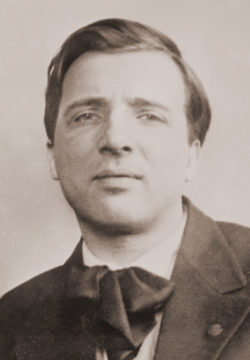
The anarchists were branded as zealots, extremists, and fanatical subversives, but peasants instinctively understood that their close ties to the labor movement meant they were firmly and unequivocally on their side. In the American diaspora, the Italian immigrant community was divided in sentiment, and many workers, already struggling under racist stereotypes, took pains to distance themselves from what they saw as yet more trouble. Many of the leading anarchists were intellectuals and came from a middle-class background, and they viewed violence as a necessary response to state- and corporate-sponsored terrorism and its efforts to crush organized labor and keep workers poor and docile. Luigi had been living in the country twelve years by the time a bomb went off in the Bronx County Court House in 1914; he and my grandmother were living only a few blocks away. What did they make of it? Did Luigi sympathize with the cause, or did his religious nature inspire mistrust in the atheist rabble-rousers? The simple imperative of putting food on the table each day quite likely prevented him from entertaining fantasies of fighting the capitalist system. Yet two years previously, Arturo Giovannitti, whose poetry became widely lauded in the United States, had been acquitted of the striker’s death in Lawrence, Massachusetts. I wonder if Luigi’s heart began beating faster when he heard the words Giovannitti had proclaimed in a Salem court in his own self-defense: “the man that owns the tool wherewith another man works, the man that owns the house where this man lives, the man that owns the factory where this man wants to go to work—that man owns and controls the bread that that man eats and therefore owns and controls his mind, his body, his heart and his soul.”
~
When Grandpa Luigi died, my father was six months shy of thirty. He’d been married and divorced, he’d been excommunicated from the Catholic Church, and he still, five years after the war’s end, hadn’t found a steady job. In the pictures of my father as a young man, I see a hint of rakishness in him, a confidence bordering on defiance. I will never know what Luigi made of his youngest son, and I can only guess at the ways in which my father yearned for his approval, but if Luigi still carried a spirit of revolt in him, perhaps it was this that my father, the youngest of nine children, later distanced himself from as he sought to forge his own identity. Italy had been fascist all throughout his childhood; his father’s native country, one of the Axis powers he’d enlisted to fight against, had become America’s enemy. The Italian labor activists of the late nineteenth and early twentieth centuries were socialists and anarchists who’d called for the end of the capitalist system; they’d rejected the authority of the King, the Church, and the landowners and brought their dangerous ways with them when they emigrated. To my father’s mind, workers’ rebellions reeked of Marxism, and while he might not have understood the precise political difference between socialism and fascism, they stood against everything he’d fought for in the war. He eventually carved out a respectable identity in blue-collar labor, conservative political principles, and a strong work ethic. Perhaps my father—as the meaning and dignity of a lifetime of service dedicated to a single company began to crumble and the inadequacy of his retirement pension emerged in shocking clarity—began to feel attracted to these more radical ideas of social justice. I wonder if he ever felt the ache of a phantom limb, some missing component to who he was and where he’d come from. He was the youngest of nine children, the eldest of whom had been closer to their parents’ origins and spoke Italian; I wonder what he thought when we came home from school rattling off in this language that he’d never learned, but that had everything to do with him, and in ways he only barely knew.
© Andrea Scrima 2023
All Rights Reserved
Information on Andrea Scrima’s first novel, A Lesser Day, can be found here.
Her second novel, Like Lips, Like Skins, was published Sept. 2021 in a German edition titled Kreisläufe. English-language excerpts have appeared in Trafika Europe, Statorec, and Zyzzyva.
